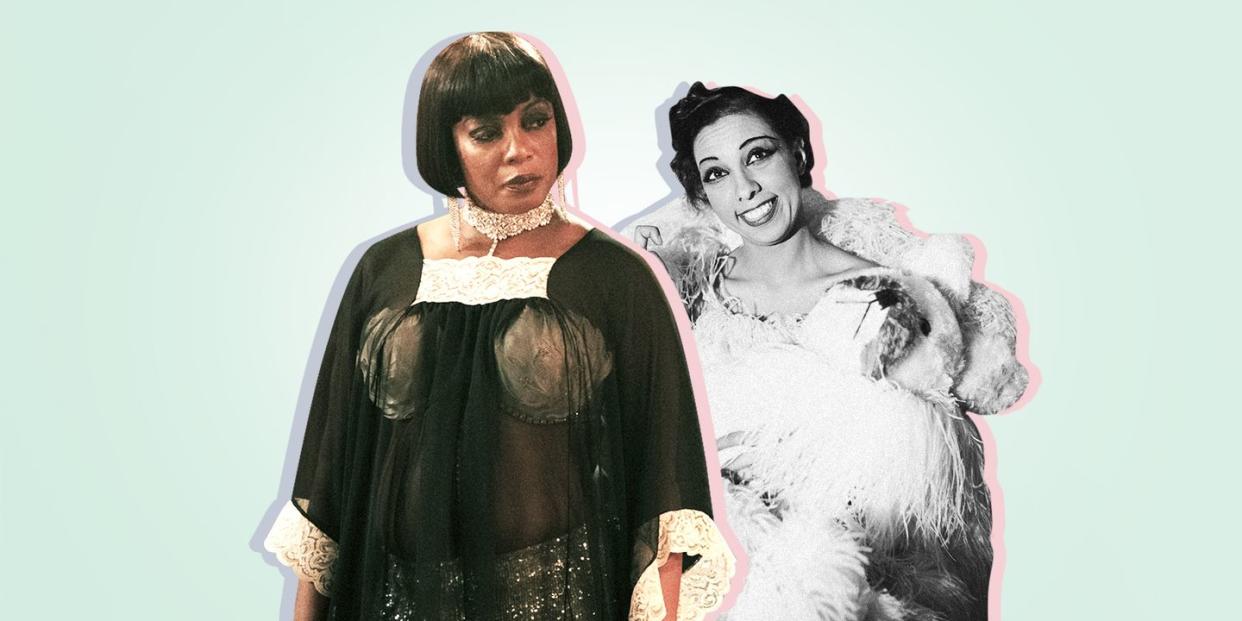Josephine Baker Was Just the Mentor Hippolyta Needed in 'Lovecraft Country'

In the latest episode of HBO’s Lovecraft Country, Hippolyta Freeman (Aunjanue Ellis) embarks on an inter-dimensional journey of self discovery that takes her across planets and eras. She spends time in 19th century Benin as a Mino warrior, the female soldiers that inspired Black Panther’s Dora Milaje, and also became a futuristic space explorer. But first, she landed in Jazz Age Paris and temporarily traded her pleasantly decorous life as a widow, mother, and travel guide publisher to become a friend and dancer for legendary entertainer Josephine Baker (Carra Patterson).
Like her time as a Mino fighter, Hippolyta’s Roaring Twenties interlude is taken from real history, and Baker was an iconic dancer, singer, actor, and activist. Here’s what you should know.
Josephine Baker was a legendary entertainer.
Baker was born in St. Louis in 1906 and grew up in poverty, attending school only until 5th grade and first marrying at the age of just 13. Soon after, she joined a traveling performance troop, before working her way into the touring cast of a Broadway musical. When Hippolyta is transported to Baker’s show, she finds herself a member of the chorus line, but is completely unfamiliar with the choreography. The scene parallels Baker’s own life—during her time as a supporting dancer, she played the humorous role of the ill-prepared last member of the chorus line who doesn’t know the group’s steps
When she was 19, Baker’s budding career brought her to Paris, where her erotic stage perfomances helped maker her a sensation. These days, Baker is best remembered for her “Danse Sauvage,” which found her wearing a costume that consisted of a skirt made of bejeweled bananas. But she was also a successful singer and film actress—her role in the 1927 silent movie Siren of the Tropics earned her a place in history as the first African-American woman to star in a movie.
Though she was a massive celebrity in France, her home country didn’t appreciate Baker nearly as much. In America, she faced the discrimation of Jim Crow and racist critics. So she made Paris her home, and contributed to the country’s war effort during World War II. She served in the Women’s Auxiliary, and worked as a spy for the French Resistance, using her status in high-society to gather intelligence and pass information written in invisible ink.
Baker was determined to live on her own terms in her private life, too. She married four men over the course of her life, and was bisexual, though it’s unclear how open she was able to be about her sexuality given the deep homopobia of her era. She adopted 12 children of different races and ethnic backgrounds, hoping that her “Rainbow Tribe” would prove interracial amity possible. She wanted to turn her home into a tourist attraction featuring a wax museum dedicated to her life, amusement park, and hotel, but went bankrupt attempting to fund it.
When she died at age 68 in 1975, 20,000 people took to the streets of Paris to see her funeral procession, and she became the first American woman to be buried with military honors in France.
She was also a staunch civil rights activist.
Baker is far from the only Black American artist to seek refuge in Paris—James Baldwin, Langston Hughes, Richard Wright, and others all famously did the same. But although she found a new home in Europe, Baker continued to champion the rights of Black Americans.
Though most famous for her work in entertainment during the ‘20s and ‘30s, it makes sense that Baker would be on Hippolyta’s mind in 1954. She’d toured the U.S. in 1951, and spoke critically of the nation’s racial caste system. Baker refused to perform in cities where she would not be able to stay in the best rooms at top hotels, or to appear in theaters that wouldn’t hire Black workers. The NAACP named May 20th “Josephine Baker Day” in her honor.

In 1963, Baker spoke at the famed March on Washington–and was the only woman to do so. “I have walked into the palaces of kings and queens and into the houses of presidents,” she said. “And much more. But I could not walk into a hotel in America and get a cup of coffee, and that made me mad. And when I get mad, you know that I open my big mouth. And then look out, ’cause when Josephine opens her mouth, they hear it all over the world.”
Afterwards, she corresponded with Martin Luther King Jr., who wrote to her in a letter: “ I am deeply moved by the fact that you would fly such a long distance to participate in that momentous event...You are certainly doing a most dedicated service for mankind. Your genuine good will, your deep humanitarian concern, and your unswerving devotion to the cause of freedom and human dignity will remain an inspiration to generations yet unborn.”
Baker was really the perfect inter-dimensional mentor for Hippolyta, a woman trying to muster the courage to define herself in the wake of her husband’s death. Baker’s boundary-breaking life offered a guide, showing how one woman overcame poverty and discrimination to become a successful performer and activist.
You Might Also Like

